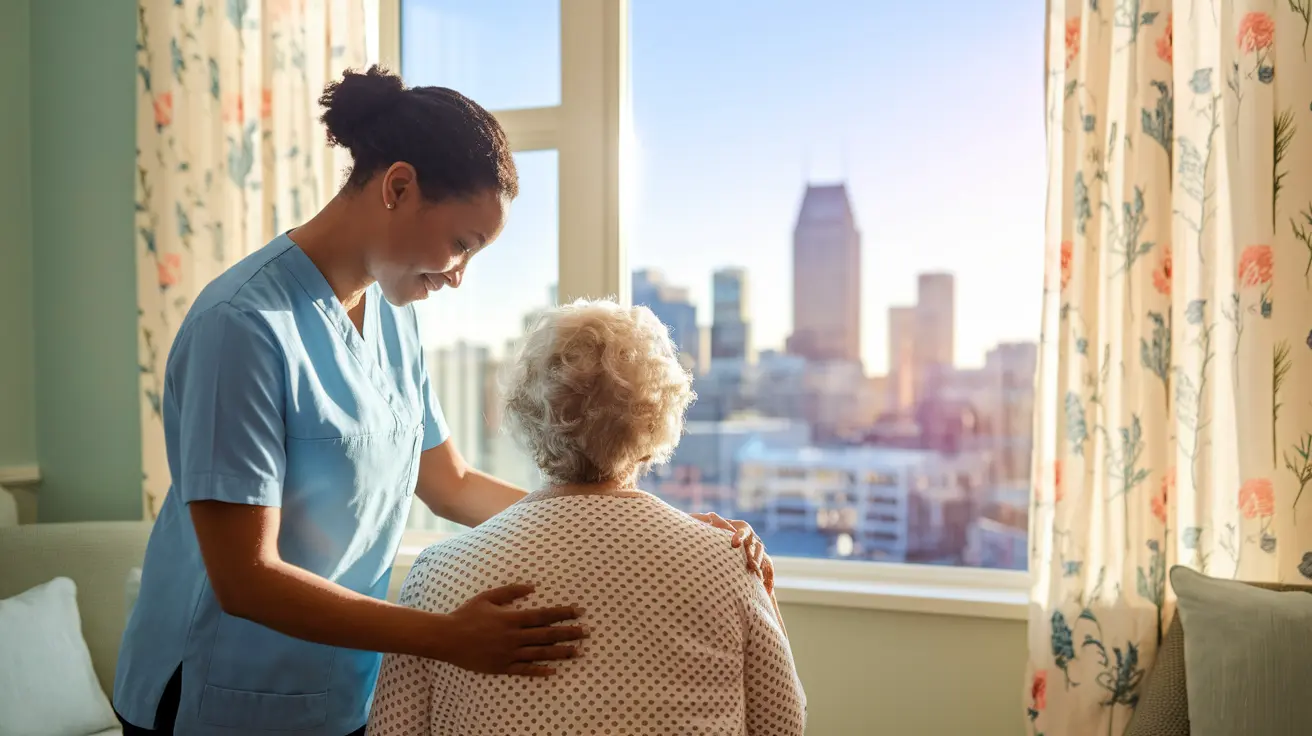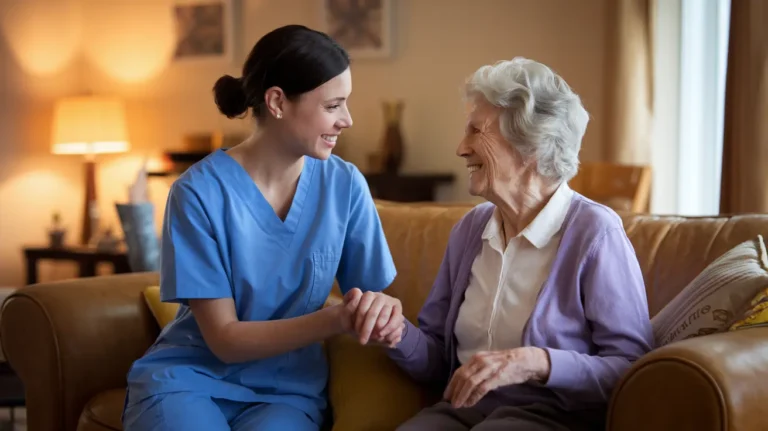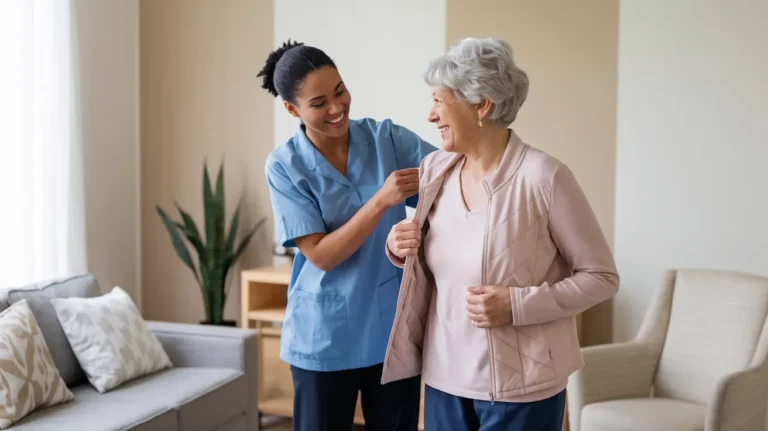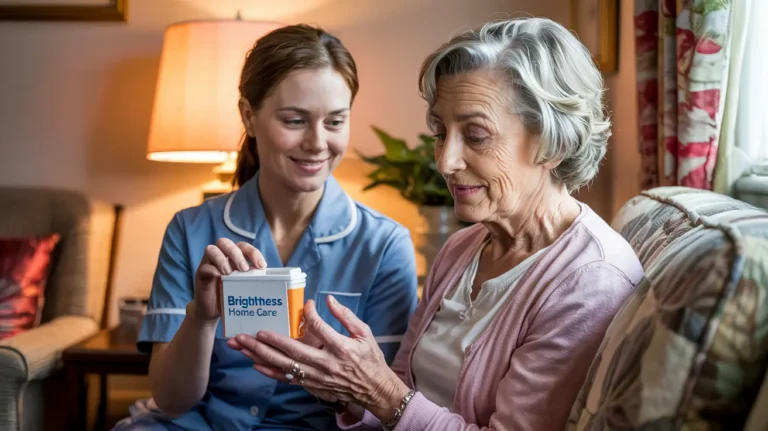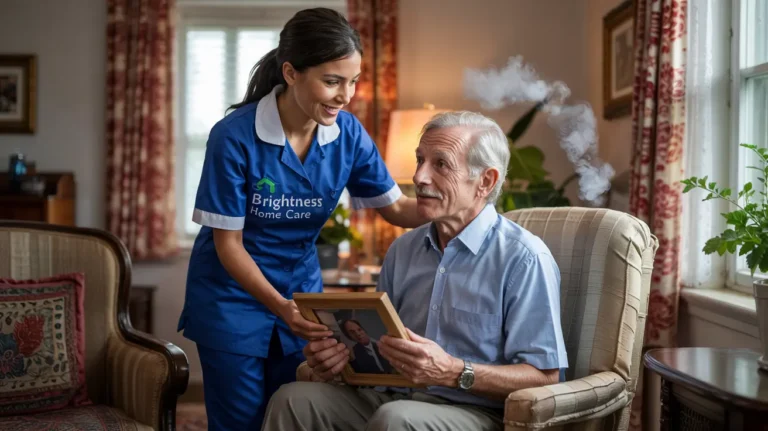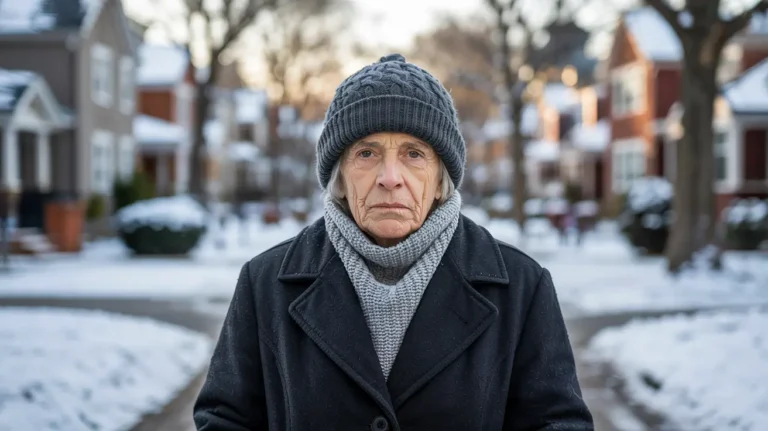Essential Caregiver Support in Indianapolis: Resources to Help You Thrive
Did you know that over 840,000 Hoosiers provide unpaid care to adults with limitations in daily activities? That’s roughly 1 in 6 adults in Indiana juggling caregiving responsibilities alongside their own lives. I’ve been there, and let me tell you – it ain’t easy!
Caregiving is one of the most rewarding things I’ve ever done, but also one of the most challenging. Whether you’re caring for an aging parent, a spouse with a chronic illness, or a child with special needs, the emotional and physical toll can be overwhelming without proper support. Trust me on this one!
Here in Indianapolis, caregivers don’t have to go it alone. There’s a robust network of resources designed specifically to help folks like us navigate this journey. And at the forefront of these support services is Brightness Home Care LLC, located at 4911 West 38th Street in Indianapolis, offering comprehensive assistance to caregivers throughout the city.
Understanding Caregiver Burnout in Indianapolis
Man, I remember when I first started caring for my mom – I thought I could handle everything myself. Big mistake! I was exhausted, irritable, and constantly worried. Turns out, I was experiencing classic caregiver burnout, and I had no idea.

Caregiver burnout is a state of physical, emotional, and mental exhaustion that can happen when you’re focused on caring for someone else without adequate support or self-care. The signs can sneak up on you – trust me, they did on me! Watch out for feelings of constant fatigue, withdrawal from activities you once enjoyed, changes in sleep patterns, and increased anxiety or depression. These aren’t just “bad days” – they’re warning signs your body and mind are overwhelmed.
In Indianapolis specifically, caregivers face unique challenges that can accelerate burnout. Our traffic congestion makes getting to multiple medical appointments across the city a nightmare (I once spent three hours just shuttling between St. Vincent’s and Community North). The weather extremes – from icy winters to humid summers – create additional obstacles for caregivers helping loved ones with mobility issues.
According to research from IUPUI, Indianapolis caregivers report higher stress levels than the national average, with about 68% experiencing moderate to severe caregiver stress. This isn’t just a statistic – it’s real people like you and me struggling to balance it all.
I’ve learned that recognizing when you need support is actually a strength, not a weakness. For me, it was when I found myself crying in the grocery store because they were out of my mom’s favorite yogurt. Seems silly now, but it was my breaking point – the moment I realized I needed help.
Some common red flags that you might need additional support include:
Changes in your health – Are you getting sick more often? Experiencing new aches and pains? Your body might be telling you something.
Emotional volatility – If you’re snapping at the smallest things or crying unexpectedly, stress might be getting the best of you.
Social isolation – When was the last time you saw friends? If you can’t remember, that’s a problem.
Sleep disturbances – Either sleeping too much or too little can signal burnout.
Loss of interest in hobbies – Those things that used to bring you joy? If they don’t anymore, burnout could be the culprit.
The wonderful team at Brightness Home Care LLC has helped me understand that seeking support isn’t giving up – it’s being smart about sustainable caregiving. Their caregiving consultants are trained to spot the signs of burnout even before you might recognize them yourself.
Remember, you can’t pour from an empty cup, as cliché as that sounds. I learned it the hard way, but you don’t have to. Indianapolis has resources specifically designed to help refill that cup, and acknowledging when you need them is the first step toward healthier caregiving.
Local Support Groups for Indianapolis Caregivers
Finding my first caregiver support group in Indy was a game-changer! I still remember walking into that church basement, feeling awkward and thinking, “I don’t belong here.” Boy, was I wrong! By the end of that first meeting, I’d laughed, cried, and felt truly understood for the first time in months.
Indianapolis offers a variety of support groups catering to different caregiving situations. The Joy’s House Caregiver Community meets twice monthly and was my personal lifesaver. The Alzheimer’s Association Greater Indiana Chapter runs several groups throughout the city – their early-stage group at the JCC on Hoover Road is especially good if you’re new to dementia caregiving.
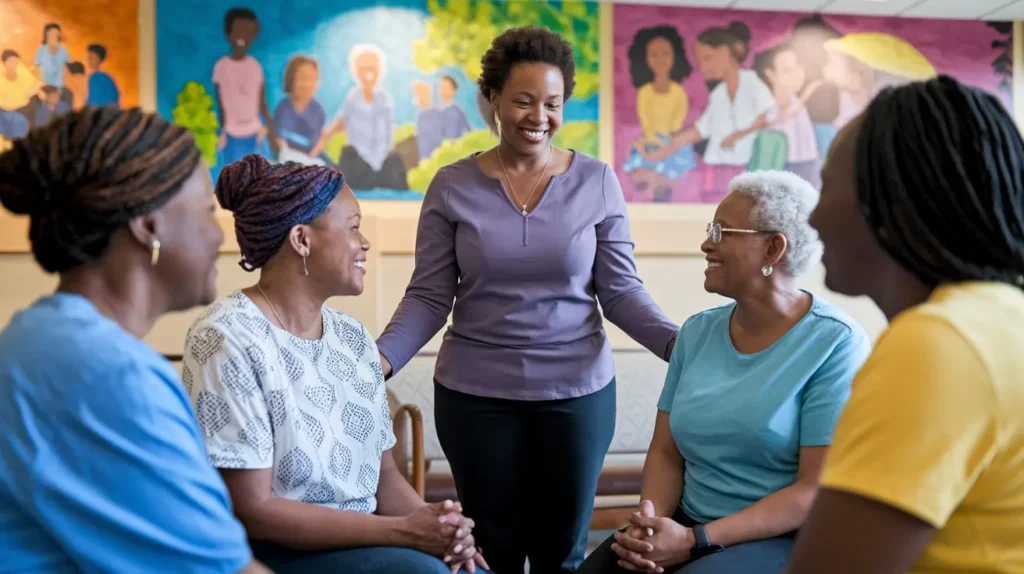
For those caring for loved ones with cancer, Cancer Support Community Central Indiana on North Meridian offers fantastic caregiver-specific programming. I met some of my closest friends there during my sister’s treatment.
Not everyone can make it to in-person meetings though – I get it! Between coordinating care, working, and trying to maintain your own life, finding time to attend a support group can seem impossible. That’s where virtual options come in clutch.
The CICOA Aging & In-Home Solutions hosts virtual caregiver connections twice weekly – you can literally join in your pajamas while your loved one naps (been there, done that!). Brightness Home Care LLC also facilitates an excellent online forum specifically for Indianapolis caregivers where you can post questions and get support any time of day or night.
The benefits of these connections can’t be overstated. In support groups, I’ve:
Learned practical caregiving hacks (like using shower curtain liners as disposable drop cloths during messy care tasks – total lifesaver!)
Found recommendations for specialists who understand our specific situation
Vented frustrations to people who truly get it without judgment
Discovered resources I never knew existed
Formed friendships that sustained me through the hardest times
One thing I love about Brightness Home Care LLC is how they approach community support. They don’t just refer you to groups – they actively facilitate connections between clients’ families facing similar challenges. Their monthly caregiver cafe at their West 38th Street location offers a casual setting to meet others while learning from rotating guest speakers on relevant topics.
They also maintain a comprehensive database of Indianapolis support groups and can match you with one that fits your specific situation and schedule. When I was struggling to find transportation to meetings, their coordinator helped connect me with another caregiver in my neighborhood for carpooling.
Remember that support groups aren’t one-size-fits-all. I tried three different groups before finding my perfect fit. Don’t get discouraged if the first one doesn’t feel right – keep trying! The connections you’ll make are worth the effort.
Professional Respite Care Services in Indianapolis
I’ll never forget the first time I took advantage of respite care. I felt so guilty about “abandoning” my father that I almost canceled. But those four hours getting a haircut, having lunch with a friend, and just sitting in a bookstore reading quietly literally saved my sanity. I came back refreshed and honestly, a better caregiver.
Respite care is temporary relief for primary caregivers, allowing you to take a break while knowing your loved one is receiving quality care. It’s not a luxury – it’s a necessity for sustainable caregiving. Think of it like charging your phone; you wouldn’t expect your phone to run forever without plugging it in, right? Same goes for you as a caregiver.
In Indianapolis, we’re fortunate to have several types of respite options:
In-home respite: A professional caregiver comes to your home. This was my preference since Dad was more comfortable in familiar surroundings. Brightness Home Care LLC specializes in this type of respite, sending trained caregivers who take the time to learn your loved one’s preferences and routines.
Adult day services: Centers like Joy’s House and Active Day provide structured activities and care during daytime hours.
Facility-based respite: Short-term stays at assisted living or nursing facilities. American Village on Harcourt Road offers weekend respite packages that many of my support group friends swear by.
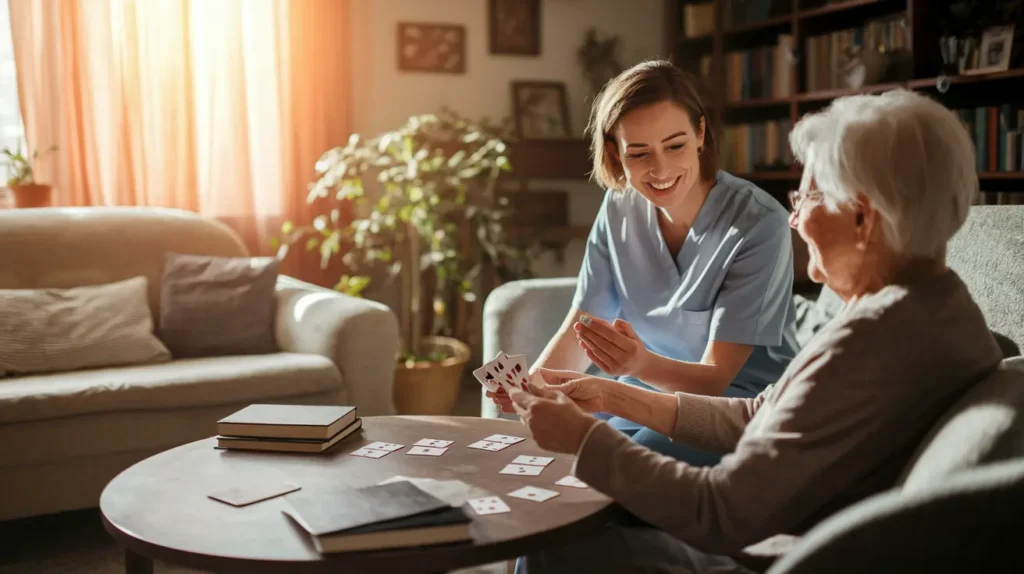
When evaluating respite care quality, I learned to look beyond the basics. Of course, safety and qualifications matter, but I also considered:
Communication style: Would they keep me updated? Could I check in without seeming like I was micromanaging?
Personality fit: My dad needed someone patient who enjoyed sports talk. Brightness Home Care LLC actually matched him with a former high school basketball coach, and they hit it off immediately.
Flexibility: Could they accommodate last-minute needs or schedule changes?
Continuity: Would the same person provide care consistently to build rapport?
What sets Brightness Home Care LLC apart in the respite care arena is their personalized approach. They don’t just send anyone – they carefully match caregivers with clients based on personality, interests, and needs. Their initial assessment is thorough, going beyond medical requirements to understand what makes your loved one comfortable and happy.
Their caregivers receive specific training in providing meaningful engagement during respite visits. My father’s caregiver didn’t just “watch” him – they looked at old photo albums together, played his favorite card games, and even helped him write letters to old friends. Dad actually looked forward to these visits!
Cost is obviously a consideration for most of us. In Indianapolis, respite care typically ranges from $20-30 per hour for in-home services to $75-125 per day for adult day services. It adds up fast, I know.
The good news is that some insurance plans, including certain Medicare Advantage plans, now cover respite care. Indiana’s Family Caregiver Support Program through CICOA can provide limited funding for respite services based on need. The Alzheimer’s Association also offers respite care grants for families affected by dementia.
Brightness Home Care LLC works with various insurance providers and can help navigate these complex systems to maximize your coverage. They also offer sliding scale options for families in need and can help identify grant opportunities you might qualify for.
My advice? Start small if you’re hesitant. Even just 3-4 hours of respite weekly can make a dramatic difference in your wellbeing. I wish I’d started using respite services months earlier than I did – it would have prevented a lot of unnecessary stress and burnout.
Financial Assistance Programs for Indianapolis Caregivers
Let’s talk money, because caregiving can put a serious strain on your wallet. I remember panicking when I realized how quickly my savings were dwindling after cutting back my work hours to care for Mom. Finding financial assistance literally kept us afloat.
Indianapolis caregivers have several state and local programs available, though navigating them can feel like solving a puzzle with missing pieces! The Indiana Family Caregiver Support Program through CICOA (Central Indiana Council on Aging) offers grants for respite care, supplemental services, and even home modifications. When we needed a wheelchair ramp installed, their $1,500 grant covered most of the cost.
Indiana’s Medicaid Aged & Disabled Waiver program was a lifesaver for us, providing in-home services that would have otherwise cost thousands monthly. The application process was admittedly a nightmare – I nearly gave up twice before a case manager at Brightness Home Care LLC helped me compile the right documentation.
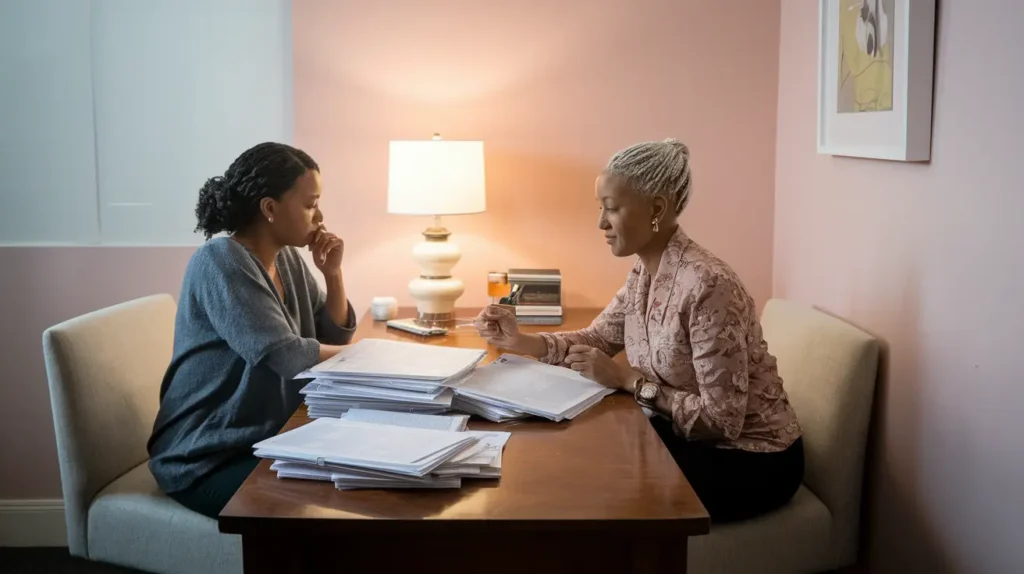
Many caregivers don’t realize they might qualify for tax benefits. If your loved one qualifies as your dependent (and they don’t need to live with you to qualify in some cases), you may be able to claim them on your taxes. Additionally, you might be eligible to deduct certain medical expenses. I was able to deduct mileage for medical appointments, prescription costs, and even some home modifications under medical expense deductions.
There are also smaller, lesser-known grant programs worth exploring. The Indiana Parkinson Foundation offers care partner grants. Various disease-specific organizations like the MS Society or ALS Association have caregiver assistance programs. Faith-based organizations like Catholic Charities and Jewish Family Services offer emergency financial assistance regardless of religious affiliation.
Navigating application processes can be overwhelming when you’re already stretched thin. Most programs require documentation of both financial need and caregiving situation. My advice? Create a single folder (physical or digital) with these commonly requested items:
Your ID and your loved one’s ID Proof of residence Proof of income (pay stubs, social security statements) Medical documentation of your loved one’s condition Detailed list of caregiving duties you perform Itemized expenses related to caregiving
Brightness Home Care LLC offers a fantastic service where their social services coordinator helps families identify programs they might qualify for and assists with applications. Their knowledge of local resources saved me countless hours of research and frustration. They even have relationships with many program administrators, which sometimes helped expedite our applications.
One caregiver in my support group received assistance with utility bills through the Energy Assistance Program when medical equipment increased their electricity costs. Another found a grant to cover specialized nutrition supplements insurance wouldn’t pay for. These small victories add up!
Don’t forget to explore workplace benefits too. Some Indianapolis employers offer paid family leave, flexible spending accounts, or employee assistance programs that can help. I was able to use my company’s EAP to get free legal assistance with setting up a power of attorney.
The financial aspects of caregiving aren’t something we typically discuss openly, but they’re critically important. Don’t let pride prevent you from seeking assistance you’re entitled to. These programs exist because society recognizes the valuable service family caregivers provide.
Self-Care Strategies for Indianapolis Caregivers
Self-care. Yeah, I know – when someone first suggested I needed “self-care” as a caregiver, I nearly laughed in their face. “With what time?!” I wanted to scream. But I’ve learned the hard way that neglecting yourself ultimately means you can’t provide good care for anyone else.
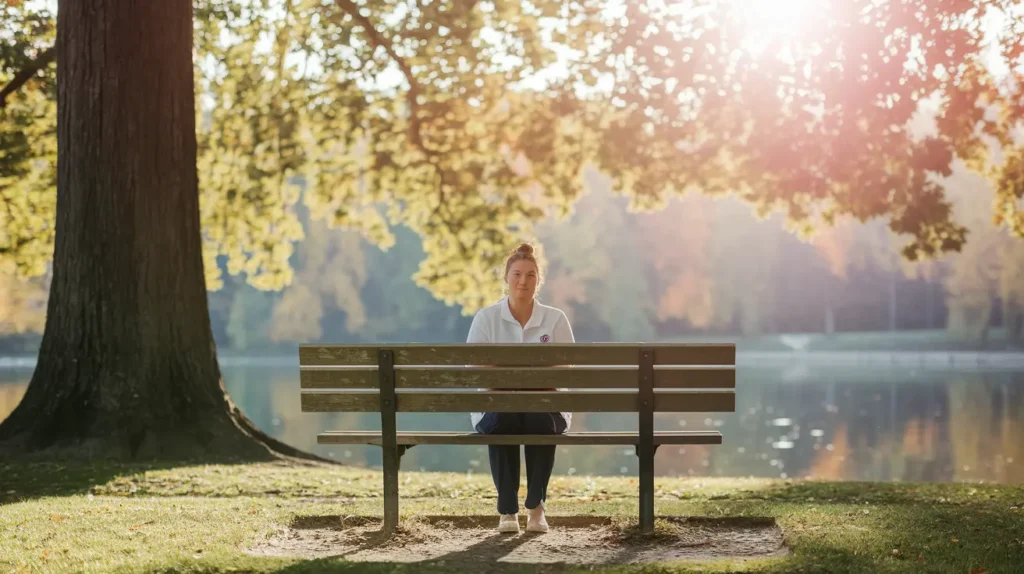
The trick is finding realistic self-care that fits into your actual life, not some Instagram fantasy version. For me, it started with five-minute breaks throughout the day. I’d step outside, breathe deeply, and just look at the sky. Sounds simple, but those mini-breaks kept me from losing it on the really tough days.
Here in Indy, we’ve got some great local resources that understand the caregiver life. The YMCA offers “Caregiver Power Hour” fitness classes scheduled specifically during common adult day program hours. The Carmel Clay Public Library has a “Caregiver Corner” with express checkout for busy caregivers and even offers home delivery if you can’t get out.
I discovered the Jordan YMCA on Westfield Boulevard has a fantastic 30-minute circuit training program perfect for caregivers with limited time. Their staff even helped me develop a 10-minute stretching routine I could do at home while my mom watched her favorite game shows.
Creating a sustainable self-care routine means being brutally honest about what’s realistic. For me, that meant:
Micro self-care: Those five-minute breaks, plus simple things like keeping hand lotion by the sink and actually using it after washing my hands for the umpteenth time each day.
Scheduled self-care: Every Wednesday evening, my sister took over so I could attend a pottery class at the Indianapolis Art Center. Having it on the calendar made it harder to skip.
Integrated self-care: Finding ways to care for myself while caregiving, like listening to my favorite podcasts during transportation to appointments or doing chair yoga alongside Mom during her physical therapy exercises.
Emergency self-care: Having a plan for those really bad days, like a playlist of songs that boost my mood or a friend I could text the word “HELP” to who understood it meant I needed someone to call and give me a pep talk.
Professional support makes better self-care possible. Brightness Home Care LLC understands this connection deeply. What impresses me about their approach is how they integrate caregiver wellness into their care plans from day one. During their initial assessment, they don’t just evaluate the client – they ask about the family caregiver’s needs too.
Their “Caregiver Wellness Check-ins” are a unique service where they periodically evaluate how you’re doing and help adjust support services accordingly. When I started showing signs of burnout, my mother’s care coordinator proactively suggested increasing respite hours temporarily and connected me with their meditation specialist who taught me simple techniques I could use anywhere.
They offer practical support that enables self-care, like scheduling care visits specifically so caregivers can attend fitness classes, support groups, or even just grocery shop in peace. Their staff is trained to encourage caregiver self-care without inducing guilt – a delicate balance many agencies miss.
Remember that self-care isn’t selfish – it’s essential. Start small if you must, but start somewhere. Even five minutes truly for yourself is better than nothing. And don’t be afraid to tell people exactly what you need. I finally learned to say, “Instead of asking how you can help, could you please just come sit with Mom next Tuesday at 2pm so I can get a haircut?” Specific requests are more likely to get results than general offers of help.
Technology Resources for Indianapolis Caregivers
I used to be pretty tech-averse until caregiving forced me to embrace helpful tools. Now I can’t imagine managing without my digital arsenal! The right technology can make caregiving more efficient and sometimes even reduce stress instead of adding to it.
For Indianapolis caregivers, several apps have been game-changers for many in my support networks. Caring Village (created by Hoosiers, btw!) helps coordinate care tasks among multiple family members. I use it to track appointments, medications, and coordinate with my siblings. No more texting back and forth about who’s taking Dad to physical therapy!
The Lotsa Helping Hands platform lets you create a care calendar where friends and neighbors can sign up for specific tasks. When my mother-in-law broke her hip, we used it to organize meal deliveries, dog walking, and transportation to follow-up appointments. The response was overwhelming – people want to help, they just need specific direction.
For medication management, I swear by Medisafe. It sends reminders, tracks doses, and even alerts you about potential drug interactions. After a scary mix-up with my father’s pills, this app provided peace of mind worth every penny of the premium subscription.
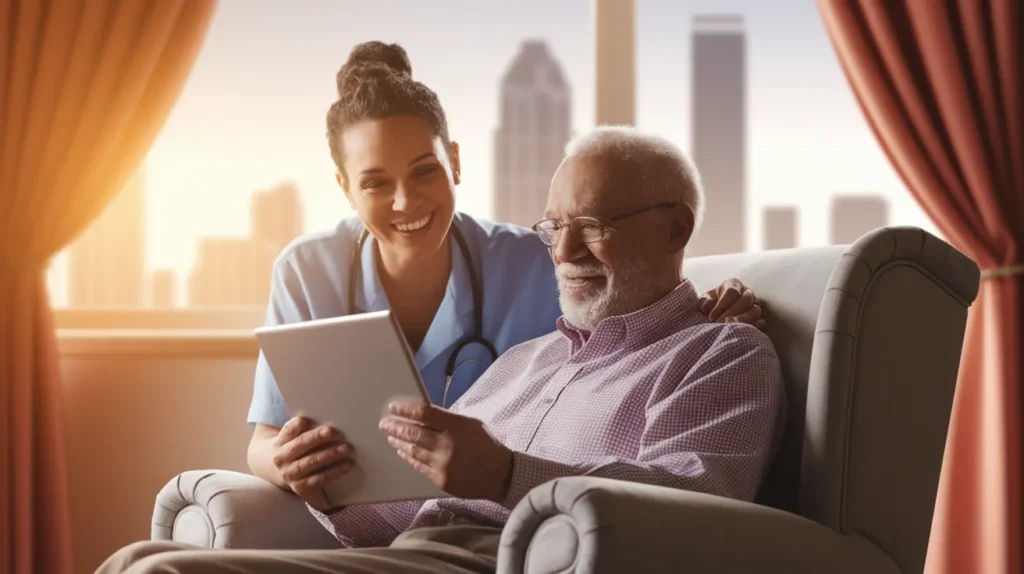
Home monitoring technology has evolved significantly beyond the old “I’ve fallen and can’t get up” buttons (though those still serve an important purpose!). Indianapolis-based company MedMinder offers pill dispensers that not only remind about medications but alert caregivers if doses are missed.
Motion sensors from companies like Aide can detect unusual patterns that might indicate a problem – like bathroom visits becoming more frequent or nighttime wandering. These systems are available through several Indianapolis home health companies, including Brightness Home Care LLC.
Telehealth has become increasingly important, especially since the pandemic. IU Health’s virtual visit platform connects you with specialists without fighting crosstown traffic. The St. Vincent’s MyChart system lets you manage appointments, view test results, and message providers directly. I’ve literally conducted doctor appointments while sitting in my car during lunch breaks!
Brightness Home Care LLC deserves special mention for how they integrate technology with their human touch services. Their care staff is trained to help clients use telehealth platforms, ensuring technical difficulties don’t prevent access to healthcare. They were the first agency I found that offered tablets pre-loaded with simplified interfaces for seniors to use for video calls with family and telehealth appointments.
Their “TechConnect” program pairs tech-savvy volunteers with caregivers wanting to learn specific technologies. When I struggled to set up automated prescription deliveries, they connected me with a volunteer who walked me through the process step by step.
What I appreciate most about their approach is understanding that technology should complement human care, not replace it. Their care coordinators help families identify which technologies would be most beneficial for their specific situation rather than pushing unnecessary gadgets.
Remember that all the fancy tech in the world can’t replace human connection and skilled care. The best approach combines thoughtful technology use with compassionate in-person support. For us, having Brightness Home Care’s trained caregivers as our foundation made it possible to successfully layer in helpful technology without becoming overwhelmed.
Oh, and don’t forget about low-tech solutions too! My favorite “technology” is still the giant whiteboard calendar in our kitchen where everyone can see the week’s appointments and activities at a glance. Sometimes the simplest solutions are still the best!
Navigating Healthcare Systems in Indianapolis
Navigating healthcare systems might be the most frustrating part of caregiving – at least it was for me! I still remember sitting in a hospital parking garage crying after being bounced between three departments, none of which could answer my simple billing question. The healthcare maze in Indianapolis can be particularly complex with our multiple hospital systems and specialty centers.
Coordinating with healthcare providers requires strategy and persistence. I learned to keep a dedicated notebook for each doctor’s appointment with prepared questions and space to record answers. When bringing my mother to her neurologist at IU Health Neuroscience Center, I’d always email questions in advance so the limited appointment time could be used efficiently.

Building relationships with key staff members – nurses, medical assistants, and office managers – proved invaluable. Beth, the office manager at our primary care physician on North Meridian, became my ally after I brought homemade cookies (shameless, I know, but effective!). She helped expedite referrals and would actually return phone calls.
Indianapolis has several important medical facilities caregivers should know about:
The IU Health Neuroscience Center offers comprehensive care for neurological conditions Eskenazi Health provides excellent care regardless of insurance status or ability to pay Riley Hospital for Children has specialized transition programs for young adults with childhood-onset conditions Community Health Network’s Anderson Brain and Spine Center specializes in rehabilitation services The Richard L. Roudebush VA Medical Center serves veterans with specialized geriatric services
Patient advocacy became a necessity when my father was hospitalized at St. Vincent. I learned to:
Request the hospital patient advocate when facing communication issues Document everything – who I spoke with, when, and what was said Bring a second person to important appointments as another set of ears Ask for clarification repeatedly until I understood completely Request written instructions for all care plans
Brightness Home Care LLC provides extraordinary support in navigating these systems. Their care coordinators often attend medical appointments with clients, taking detailed notes and asking pertinent questions. They understand the local healthcare landscape intimately and can recommend specialists with experience in specific conditions.
Their medication reconciliation service was particularly helpful after my mother’s hospital discharge, when she somehow came home with duplicate prescriptions under different names. Their nurse reviewed everything and coordinated with the pharmacist and doctor to resolve the confusion.
What sets them apart is their proactive approach to healthcare coordination. Rather than just responding to crises, they help anticipate needs and ensure preventive care doesn’t fall through the cracks. When my father’s dementia made dental visits challenging, they found a dentist who specialized in treating patients with cognitive impairments and arranged transportation.
Their staff is trained to recognize subtle health changes that might warrant medical attention. Several times, their caregivers noticed concerning symptoms before I did, allowing for earlier intervention. Their documentation system ensures all caregivers are aware of health concerns and follow-up needs, creating continuity even with multiple care providers.
Located conveniently on West 38th Street, Brightness Home Care LLC has established relationships with healthcare providers throughout Indianapolis. These connections often facilitate smoother communication and coordination. When my mother needed urgent care but her primary doctor was booked solid, their care coordinator was able to get her seen the same day through their professional network.
Remember, you are your loved one’s best advocate. Don’t be afraid to speak up, ask questions, or seek second opinions. The healthcare system can be intimidating, but with persistence and the right support, you can ensure your loved one receives appropriate care.
Conclusion
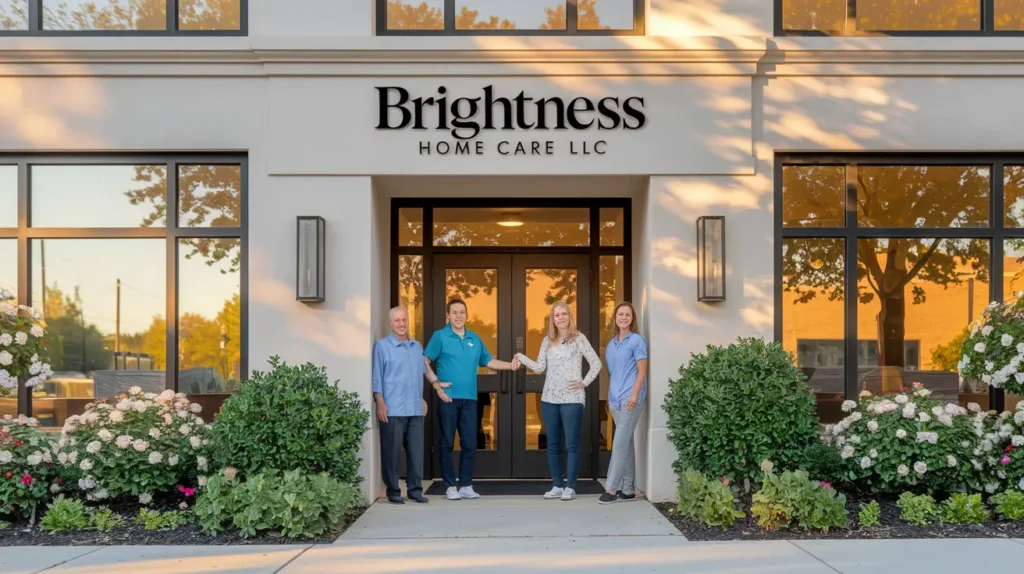
Whew! We’ve covered a lot of ground, haven’t we? If there’s one thing I hope you take away from all this, it’s that you don’t have to navigate the caregiver journey alone here in Indianapolis. From support groups to respite care, financial assistance to technology tools, resources exist to lighten your load.
Establishing a support network might feel overwhelming when you’re already stretched thin, but even small steps make a difference. Start with just one resource – maybe join that online support group or schedule a consultation with Brightness Home Care LLC to explore options. Each connection creates ripples that can eventually transform your caregiving experience.
Safety and self-care aren’t optional extras – they’re essential foundations for sustainable caregiving. Remember that accepting help isn’t a sign of weakness or failure; it’s a wise strategy for providing the best possible care while maintaining your own wellbeing.
Brightness Home Care LLC stands ready to support Indianapolis caregivers with their comprehensive approach to both client and caregiver needs. Their unique understanding of our local landscape and commitment to personalized care makes them a valuable ally for families navigating these challenging waters.
What’s your experience been like as a caregiver in Indianapolis? Have you discovered resources or strategies that have been particularly helpful? Or are you just beginning this journey and feeling overwhelmed? Either way, you’re not alone, and reaching out is the first step toward finding the support you deserve. Your story matters, and sharing it might just help another caregiver find their way.

